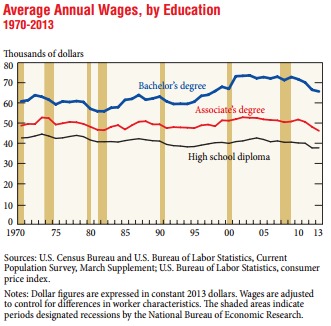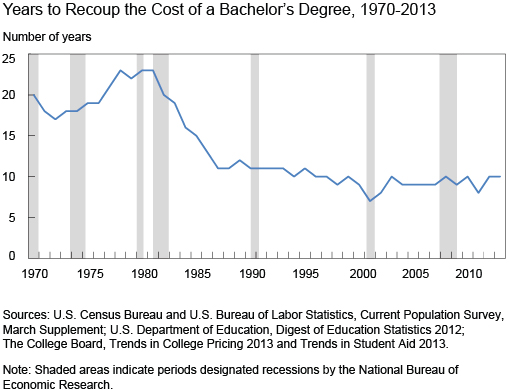Is College Worth It?
By:
As the class of 2015 graduates, you are likely to see a barrage of stories about student debt, the job market, and in particular, whether college is worth it.
Pundits especially love to debate the "is college worth it?" question, as it's both provocative and well-suited for counterintuitive headlines.
Just look at these articles for instance:
Salon: "Millennials, rise up! College is a scam — you have nothing to lose but student debt"
Forbes: "Don't Buy The Hype, College Education Is Not An Investment"
Wall Street Journal: "For Most People, College Is a Waste of Time"
Make no mistake: student loan debt is incredibly vexing. According to a 2014 White House report, the "average real debt per borrower increased from $24,000 in 2004 to $30,000 in 2012." A 2015 analysis from Eadvisors recently put the average borrower's debt around $35,000. Regardless of what figure you use, it's pretty unsettling.
ATTN: has also written many times about the problematic nature of expensive education and how the likelihood of saving for cars, homes, or other important consumer goods with debt becomes more difficult. We also support the notion of debt-free college and advocate for a fundamental restructuring of how higher education is financed in the United States. Take a look at this video we made, for example:
But what's even more vexing than monthly student debt repayments is the experience of trying to accrue wealth in America without a college degree. As the White House reports, "a four-year degree yields approximately $570,000 more in lifetime earnings than a high school diploma alone, while a two-year degree yields $170,000 more" than high school educated workers.
Labor Department research indicates that those with a bachelor's degree earn 80% more on average (throughout their lifetime) than their high school diploma counterparts.
And some data indicates that college graduates will earn about $1 million more over the course of their lifetimes.
From the Pew Research Center in 2014:
On virtually every measure of economic well-being and career attainment—from personal earnings to job satisfaction to the share employed full time—young college graduates are outperforming their peers with less education. Millennial college graduates ages 25 to 32 who are working full time earn more annually—about $17,500 more—than employed young adults holding only a high school diploma. The pay gap was significantly smaller in previous generations.
From the New York Federal Reserve in 2014:
The time required to recoup the costs of a bachelor’s degree has fallen substantially over time, from more than twenty years in the late 1970s and early 1980s to about ten years in 2013.
 US News - usnews.com
US News - usnews.com
From the Brookings Institute:
According to the findings, a typical bachelor's degree graduate will earn $1.19 million over their lifetime, about twice what the typical high school graduate earns.

It turns out there is not much a debate. College is definitely worth it. Increasing college enrollment is generally a good thing for young people. YouTube personality John Green also has one of the best explanations ever as to why:
The one caveat: for-profit colleges. Mounting data indicates most of these schools are probably not worth it.
